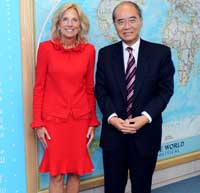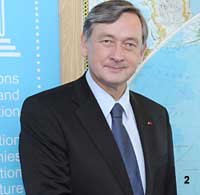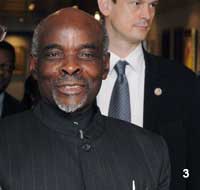UNESCO World Conference on Higher Education opens With Call to Address Global Challenges
Paris, 6 July

- © UNESCO/Michel Ravassard
- Jill Biden, wife of US Vice-President Joe Biden
The World Conference on Higher Education, gathering close to 1,000 participants from 148 countries, opened on 5 July at UNESCO Headquarters in Paris with a call for higher education to address global development challenges.
“Higher education institutions play a strategic role in finding solutions to today’s leading challenges in the fields of health, science, education, renewable energies, water management, food security and the environment,” said UNESCO’s Director-General
Koïchiro Matsuura.
Speakers at the opening ceremony highlighted the importance of education as a response to the global economic crisis and stressed equity, quality and international cooperation as critical challenges for all governments.
“President Obama sees higher education as critical to the administration’s plans to revitalize the American economy and he has moved quickly to support students and their families,” said Jill Biden, wife of US Vice-President Joe Biden and a community college teacher.

President Danilo Türk of Slovenia urged that higher education be fully engaged in achieving the Millennium Development Goals, “the most ambitious objectives of our time” and fostering dialogue among civilizations. Prime Minister Nahas Angula of Namibia stressed that higher education should “put new techniques to work for the public good” and “develop new leaders who are guided in their decision-making by a moral compass rather than short-term gains.”

Higher education is going through a ‘veritable revolution,’ said UNESCO’s Director-General, outlining four dynamics that are transforming higher education. The first is accelerating demand, with an additional 51 million new students enrolled in tertiary education worldwide since 2000. The second is the diversification of providers, with private higher education now accounting for more than 30 per cent of enrolments worldwide. The third is the impact of information and communication technologies; the fourth is globalization that is “manifest in how we teach, learn, study, research and communicate.” In this context, he said, “we must strike a balance between cooperation and competition with a view to promoting excellence for the largest numbers.”
Improving access is an issue in all countries. “I am here because I see in my classroom the power of education to open doors,’ said Dr Biden. “Regardless of personal wealth, gender, race, religion or ethnicity, each and every one of us is entitled to the opportunity that education provides.”
Dr Biden, spoke about her passion for teaching and the influential role that community colleges play in America’s university system, serving nearly half of all US undergraduate students. She explained that these colleges are often the best option for students of limited financial means and “lead the way in preparing graduates in the fields of green technology, healthcare, teaching, and information technology.”
More diverse funding sources can promote more open access to higher education, said Angel Gurria, Secretary-General of the OECD. Citing a review of tertiary education policies carried out by the OECD, he said that “the best way to provide effectiveness and fairness is a well-designed model for charging students a contribution but we need to be careful and recommend adequate financial support in the form of loans or grants and help with living expenses.” He warned that policies should focus on the relevance of what students learn and on tackling youth unemployment. “Those who have the privilege of studying are suffering enormous frustration because they cannot get a job.”
Speakers insisted on the role of strong international cooperation to ensure quality provision against the backdrop of increasing student mobility and the rise of cross-border education. President Türk, a former professor of international law, emphasized that improving quality and relevance was closely linked to promoting academic freedom.
Benita Ferrero-Waldner, European Commissioner for External Relations, drew attention to the role of the Erasmus programme that benefits more than 150,000 people each year in Europe. But she stressed the need to design courses that are more relevant to labour market needs and to further encourage universities to broaden their funding base. For President Türk, Europe’s research capacity should be strengthened: “Europe has too few researchers and European research work has not been awarded as it should be.”
Dame Pearlette Louisy, the Governor General of Saint Lucia, shared the perspective of small states. “More attention needs to be paid to small developing states if they are to contribute to the global environment as serious players,” she said, calling for cooperation to strengthen national capacity and research capability and encourage the creation of indigenous knowledge.
“We share a mutual interest in developing vibrant inclusive higher education systems, said Mr Matsuura. “Such systems have the potential to promote peace, international understanding and cooperation. This Conference offers us a landmark opportunity to put into action our collective responsibility and ambition to make higher education in all regions a driver of development and international understanding in this second decade of the 21st century.”
- Author(s):UNESCOPRESS
- Source:Press Reelase No. 80-2009
- 07-07-2009
- Photo 2 : © UNESCO/Michel Ravassard - President Danilo Türk of Slovenia
- Photo 3 : © UNESCO/Michel Ravassard - Prime Minister Nahas Angula of Namibia


